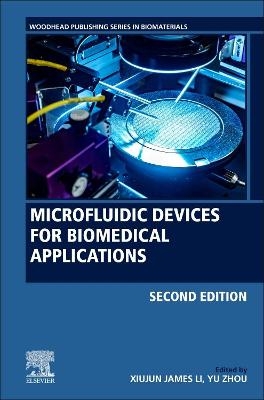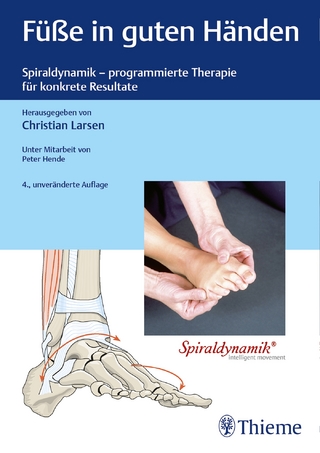
Microfluidic Devices for Biomedical Applications
Woodhead Publishing (Verlag)
978-0-12-819971-8 (ISBN)
This book is an essential reference for medical device manufacturers, scientists and researchers concerned with microfluidics in the field of biomedical applications and life-science industries.
XiuJun (James) Li, Ph.D., is an Associate Professor with early tenure in the Department of Chemistry and Biochemistry, Biomedical Engineering, and Border Biomedical Research Center at the University of Texas at El Paso (UTEP), USA. After he obtained his Ph.D. degree in microfluidic lab-on-a-chip bioanalysis from Simon Fraser University (SFU) in Canada in 2008, he pursued his postdoctoral research with Prof. Richard Mathies at University of California Berkeley and Prof. George Whitesides at Harvard University, while holding a Postdoctoral Fellowship from Natural Sciences and Engineering Research Council (NSERC) of Canada. He has gained extensive experience in bioanalysis using microfluidic systems, such as single-cell analysis, genetic analysis, low-cost diagnosis, pathogen detection, 3D cell culture, and so on. Dr. Li’s current research interest is centered on the development of innovative microfluidic lab-on-a-chip and nanotechnology for bioanalysis, biomaterial, biomedical engineering, and environmental applications, including but not limited to low-cost diagnosis, nano-biosensing, tissue engineering, and single-cell analysis. He has coauthored about 100 publications in high-impact journals (such as Adv. Drug Deliv. Rev, Appl. Catal. B-Environ, Anal. Chem., Lab Chip, Biosens. Bioelectron.) and 22 patents, including two books from Elsevier on microfluidic devices for biomedical applications. He is an Advisory Board member of Lab on a Chip and Analyst, the Founder of microBioChip Diagnostics LLC, and an editor of 6 journals including Scientific Reports from the Nature publishing group, Micromachines, etc. He is the recipient of the “Bioanalysis New Investigator Award in 2014, UT STARS Award in 2012, NSERC Postdoctoral Fellow Award in 2009, and so on. For more information, please visit http://li.utep.edu. Yu Zhou, PhD, is a Research Scientist in the Department of Research and Development at ABS Global Inc., USA. Dr Zhou received his Ph.D. degree in mechanical engineering from University of Illinois at Chicago in 2010. After graduation, he joined ABS Global, the world-leading genetics provider company as a key researcher and has been working on the development of a high-throughput microfluidic cytometry for biological cell detection and manipulation. He obtained extensive experience in design and fabrication of silicon-based microsystems and disposal plastic microfluidic chips, precision fluid delivery, and microfluidics-based single cell separation and analysis. He is a member of ASME and serves on the advisory editorial board for several technical journals including Microsystem Technologies, and Journal of Mechanical Engineering Research (Canada) since 2011.
Part I Fundamentals of microfluidic technologies for biomedical applications 1. Materials and methods for the microfabrication of microfluidic biomedical devices 2. Surface coatings for microfluidic-based biomedical devices 3. Actuation mechanisms for microfluidic biomedical devices 4. Droplet Microfluidics for biomedical devices
Part II Applications of microfluidic devices for drug delivery and discovery 5. Controlled drug deliver using microfluidic devices 6. Microneedles for drug delivery and monitoring 7. Microfluidic devices for drug discovery and analysis
Part III Applications of microfluidic devices for cellar analysis and tissue engineering 8. Microfluidic devices for cell manipulation (review type) 9. Microfluidic devices for single cell trapping and automated micro-robotic injection (specific research topic) 10. Microfluidic devices for developing tissue scaffolds 11. Microfluidic devices for stem cell analysis 12. 3D printing and applications
Part IV Applications of microfluidic devices in diagnostic Sensing 13. Development of immunoassays for protein analysis 14. Integrated microfluidic systems for genetic analysis 15. Low-cost assays in paper-based microfluidic biomedical devices 16. Microfluidic devices for viral detection 17. Microfluidics for monitoring and imaging pancreatic islet and betal-cells for human transplant
| Erscheinungsdatum | 02.07.2021 |
|---|---|
| Reihe/Serie | Woodhead Publishing Series in Biomaterials |
| Sprache | englisch |
| Maße | 152 x 229 mm |
| Gewicht | 1440 g |
| Themenwelt | Medizin / Pharmazie ► Physiotherapie / Ergotherapie ► Orthopädie |
| Technik ► Maschinenbau | |
| Technik ► Medizintechnik | |
| Technik ► Umwelttechnik / Biotechnologie | |
| ISBN-10 | 0-12-819971-7 / 0128199717 |
| ISBN-13 | 978-0-12-819971-8 / 9780128199718 |
| Zustand | Neuware |
| Informationen gemäß Produktsicherheitsverordnung (GPSR) | |
| Haben Sie eine Frage zum Produkt? |
aus dem Bereich


